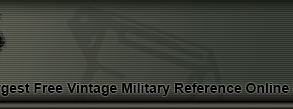German NSKK Service Dagger -
The National Socialist Motor Corps (German: Nationalsozialistisches Kraftfahrkorps, NSKK), also known as the National Socialist Drivers Corps, was a paramilitary organization of the Nazi Party that existed from 1931 to 1945. The group was a successor organization to the older National Socialist Automobile Corps, which had existed since the beginning of 1930. It was headed by Adolf Hühnlein from 1934. After Hühnlein's death in 1942 Erwin Krauss took over his position as Korpsführer (Corpleader).
The National Socialist Motor Corps was the smallest of the Nazi Party organizations and had originally been formed as a motorized corps of the Sturmabteilung (SA). In 1934, the group had a membership of approximately ten thousand and was separated from the SA to become an independent organization. This action may have saved the NSKK from extinction, as shortly thereafter the SA suffered a major purge during the Night of the Long Knives.
The primary aim of the NSKK was to educate its members in motoring skills. They were mainly trained in the operation and maintenance of high performance motorcycles and automobiles. In the mid 1930s, the NSKK also served as a roadside assistance group, comparable to the modern-day American Automobile Association or the British Automobile Association.
The NSKK Service dagger was instituted in 1933. The dagger was produced until 1945. No less than 455,000 of these
daggers were produced during that time. It was issued to the front line NSKK personnel.
The highest NSKK dagger was the 1938 Fuhrer model
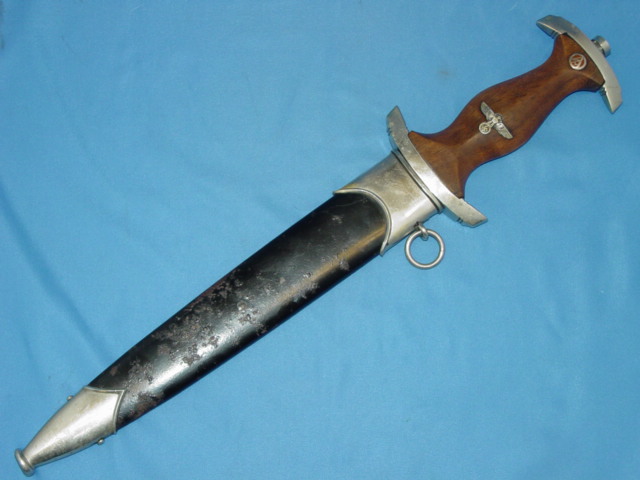
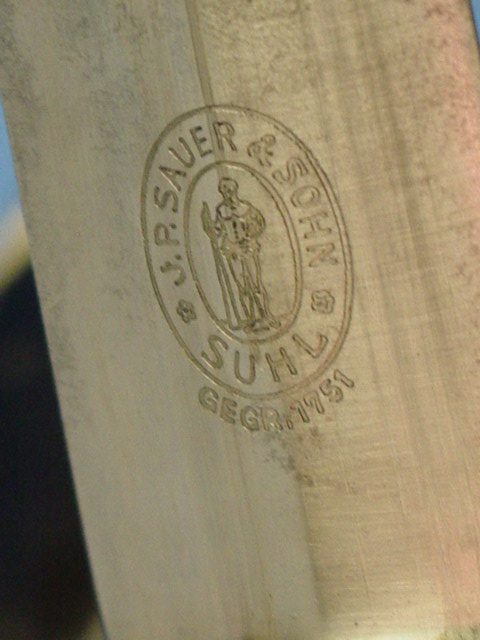
The dagger consists of a smooth dark brown wooden handle with a matching color metal
scabbard. The handle has an eagle in one side. It has its wings extended and it is
facing to the right. It is cluthing a swastika with both claws. The SA symbol is
displayed inside a circle placed just above the eagle. The handle is of black color.
The blade has a doiuble-edge. The words "Alles Fur Deutchland" are placed on one side.
The manufacturer's logo is placed on the other side. This dagger was made by J.P.
Sauer & Sohn from the city of Suhl.
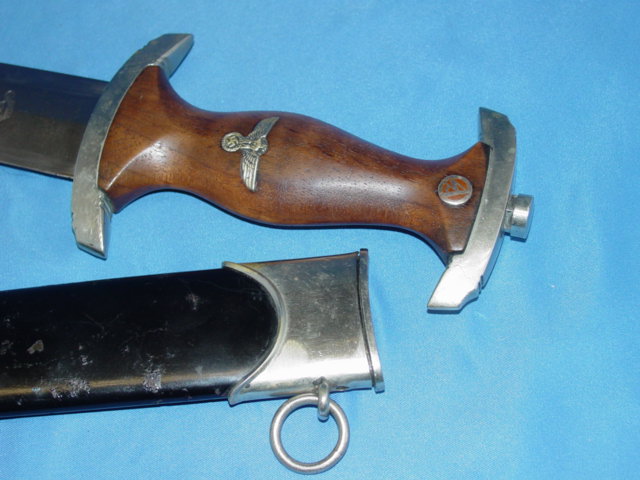 |
|
This page is a recognition and identification guide for German bayonets. Multiple
detailed photos of a specific sample are provided. Descriptions point out specific
points that should be noted.
One of the most commonly asked questions is "How much is my German bayonet worth?".
A price guide is included here to address this question. The value of the Nazi bayonets is
reviewed over a period of several years. A trend can be observed. The present worth
of the police sword in the collector's market is illustrated.
This service is provided free of charge to the visitor/enthusiast courtesy of
MilitaryItems.com,
a company dedicated
to the preservation of military history and to providing quality military antiques and
collectibles to museums, institutions and the general public.
|
|
|
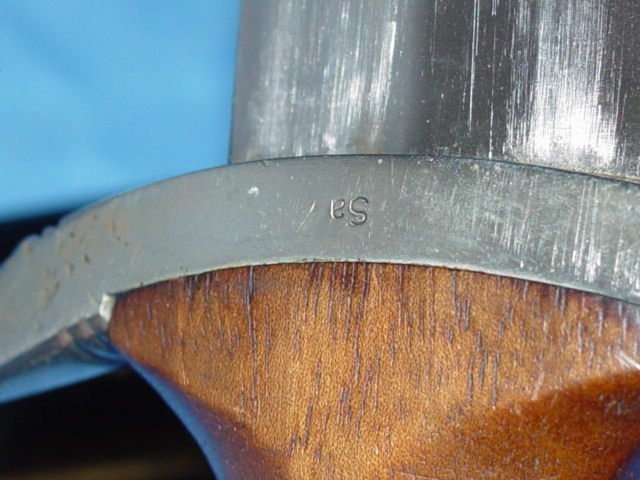
The scabbard has two metal fittings. One in the throat area and the other at the tip.
A ring is attached to one side of the throat fitting. This is where the leather hanger
is secured.
The hanger shown here has numbers stamped on its body. This was a common practice but
was not always done. It is possible to find hangers that do not have any markings.
A silver metal buckle is provided to adjust the length of the hanger.
A silver clip is attached at the end of the hanger. The back shows an RZM stamp
that reads M5/71, where M5 is the designation given to all buckles and 71 is the
manufacturer's code (Horster). A diamond shape marking is placed just below the RZM
number. This is also a manufacturer's marking.
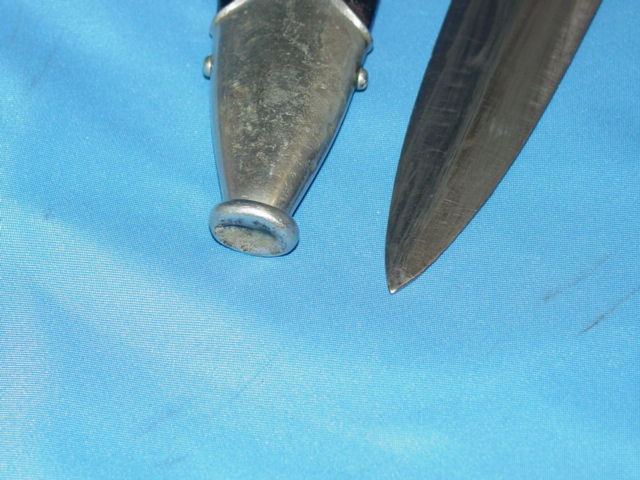
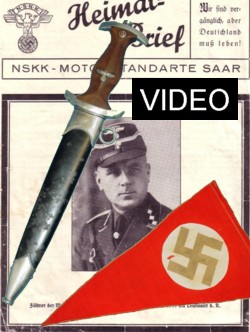
|
The "Military minute" is a series of instructional videos created by MilitaryItems.com for the purpose of
providing basic information about military collectibles. The idea is to expose people to the exciting
world of military collectibles.
The video presentation coupled with detailed photographs and written information, including a military
collectible's price guide, enhances the visitor's experience.
Whether you are a long time collector, a beginner or simply have an interest in the history and value of
each collectible, we hope that you find the information presented here useful.
|
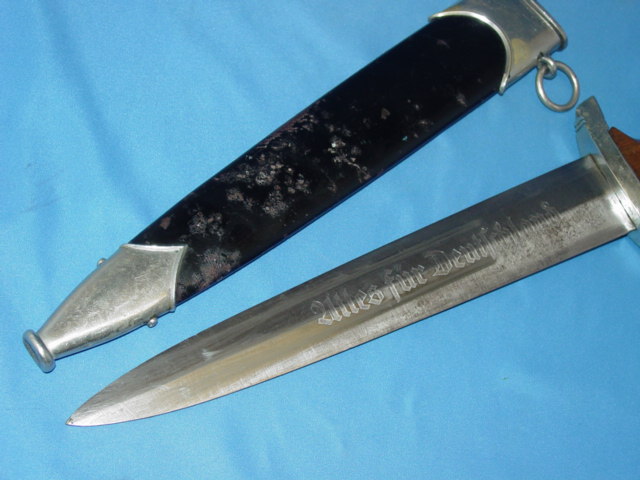
The tip of the scabbard was commonly dented from dropping the dagger. The dagger
featured here does not have that damage.
|
Many German edge weapons are currently
reproduced.
It is becoming more difficult to be able to tell the fake ones from the real ones because
the quality of the reproductions is improving. The collector must become familiarized with
the construction style and materials employed in the manufacturing of this item.
Attention to the details is critical in order to be able to determine the authenticity of
the collectible.
If you have an interest is seeing other edge weapons of the Third Reich, you can do so by going
to our
WWII German daggers and Swords
identification guide, Where we cover blades from the Heer (Army), Navy (Kriegsmarine), Air Force
(Luftwaffe) and other organizations.
|


